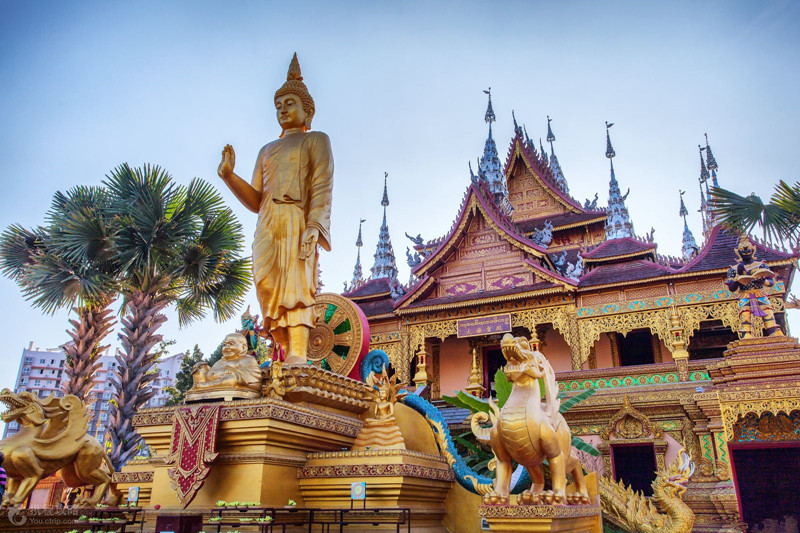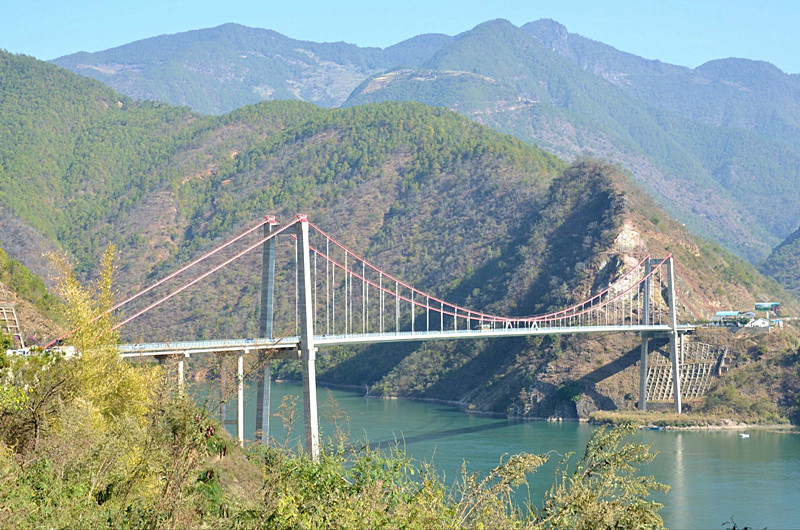Xishuangbanna Weather in June
Xishuangbanna Weather and Climate in June
When you travel to Xishuangbanna in June, rain season is from May to October each year in Xishuangbanna. In June, the southwest monsoon become stable. The average minimum temperature (usually the minimum temperature is noted during the night) in Xishuangbanna in June is 22.8°C (73°F). The average maximum temperature in Xishuangbanna in June lies around 32.8°C (91°F).

Historical Xishuangbanna Average Daily Temperatures in June
| June | Average Low | Average High |
| 1 | 22.8°C /73°F | 32.8°C /91°F |
| 2 | 22.8°C /73°F | 32.8°C /91°F |
| 3 | 22.8°C /73°F | 32.8°C /91°F |
| 4 | 22.8°C /73°F | 32.8°C /91°F |
| 5 | 22.8°C /73°F | 32.8°C /91°F |
| 6 | 22.8°C /73°F | 32.8°C /91°F |
| 7 | 22.8°C /73°F | 32.8°C /91°F |
| 8 | 22.8°C /73°F | 32.8°C /91°F |
| 9 | 22.8°C /73°F | 32.8°C /91°F |
| 10 | 23.3°C /74°F | 32.8°C /91°F |
| 11 | 23.3°C /74°F | 32.8°C /91°F |
| 12 | 23.3°C /74°F | 32.8°C /91°F |
| 13 | 23.3°C /74°F | 32.2°C /90°F |
| 14 | 23.3°C /74°F | 32.2°C /90°F |
| 15 | 23.3°C /74°F | 32.2°C /90°F |
| 16 | 23.3°C /74°F | 32.2°C /90°F |
| 17 | 23.3°C /74°F | 32.2°C /90°F |
| 18 | 23.3°C /74°F | 32.2°C /90°F |
| 19 | 23.3°C /74°F | 32.2°C /90°F |
| 20 | 23.3°C /74°F | 32.2°C /90°F |
| 21 | 23.3°C /74°F | 32.2°C /90°F |
| 22 | 23.3°C /74°F | 32.2°C /90°F |
| 23 | 23.3°C /74°F | 32.2°C /90°F |
| 24 | 23.3°C /74°F | 32.2°C /90°F |
| 25 | 23.3°C /74°F | 32.2°C /90°F |
| 26 | 23.3°C /74°F | 32.2°C /90°F |
| 27 | 23.3°C /74°F | 32.2°C /90°F |
| 28 | 23.3°C /74°F | 32.2°C /90°F |
| 29 | 23.3°C /74°F | 31.7°C /89°F |
| 30 | 23.3°C /74°F | 31.7°C /89°F |
What to Wear for a June Xishuangbanna Travel
Because of its tropical location, the cool clothes will be suitable. The weather is refreshing, the climate is pleasant, the day temperature is relatively hot, so you can take cool and comfortable clothes such as short sleeves, shorts, skirts, etc. At night, when the temperature drops, you need to take a thin coat to avoid catching cold.
Useful Travel Tips for your Xishuangbanna Travel in June
- To the Dai people, Xishuangbanna was known as ‘Mengbanaxi’ in ancient times, a name that means a miraculous and nice utopia. It had been a settlement where 13 ethnic minorities have lived in tight-knit communities for generations. The Jino ethnic minority is peculiar to the prefecture.
- Special Local Products: tea, coffee, tropical fruit, herbs, Yunnan tobacco…
- The Lancang River runs through the prefecture and when it passes through Laos, Thailand, Cambodia and Vietnam, it is known as the Mekong River.
- Please show due respect when visiting religious places. Respect the local customs of Dai and other minorities.
- Do not touch the head of local monks.
- Rain season is from May to October each year in Xishuangbanna, so remember to bring your umbrella and raincoat when you out.
- There are many mosquitoes in the forest, and Mosquito Repellent for repelling mosquitoes is necessary.
Places to Visit in June Xishuangbanna
-
Xishuangbanna Tropical Flower and Plant Garden:
Tropical Plants Garden is the biggest and richest botanical garden in China nowadays, which has established relationship with over 50 counties worldwide, and its international influence moves up gradually. Now, it is the National Education Base of Science and the National Tourism Spot. - Jinuo Mountain village:
At the Jinuo village the visitor can observe first-hand the unique lifestyle of this special minority group, and, with a bit of luck, one might observe a Jinuo religious ceremony where ritualistic music is played involving the use of very large – and sacred – sun-drums. - Manfeilong Pagoda:
It is located on top of the mountain in Manfeilong Village in Jinhong County of Yunnan Province. The pagoda is a famous stupa group in Xishuanbanna. The Water-Sprinkling Festival, the Dai people, men and women, old and young, will dance around the pagodas to cerebrate the New Year, is usually celebrated in the middle of April, lasting 3 to 7 days. - Ganlanba (Olive Plain ):
Hundreds of Dai families have lived there for generations, so there is a strong tropical and ethnic flavor, which is a combination of bamboo houses belonging to the Dai families and water scenery. A wide variety of tropical fruits are produced there, such as coconuts, betel nuts, bananas, mangoes, lychees, starfruits, jackfruits, passion fruits, and so on. In addition to fresh fruits, Ganlan Basin also produces a lot of preserved fruits, so fresh fruit and preserved fruit markets can be seen everywhere.Zongfosi Temple in Jinghong City, XishuangBanna - Zongfosi Temple:
Zongfosi is the leading temple of Xishuangbanna, also the oldest one. Before the Reform and Opening, it was the holy land where Zhaopianling, the chieftain of Xishuangbanna, worship Buddha. It goes through the millennium vicissitudes. It is the holy land of Hinayana Buddhism, even renowned in south Asian. - The Lancang River:
(also called the Mekong River) has an 1187.5 kilometer-long stretch flowing through Xishuangbanna. At the moment, the Lancang River Tour is divided into two sections. The upper section is 135 kilometers long, from Jinghong to Simao; the lower section is 40 kilometers in length, from Jinghong to Olive Basin. The lower section attracts more tourists at present. Visitors will be enchanted by the primeval tropical rain forestand animals along the two banks of the river, especially by the incredible “Sky Garden”, where flowers bloom happily on dead branches and some trees have aerial roots, and the “One Tree Forest”.Xiyi Lancang-Mekong River Bridge in Yunxian County, Lincang - The ManDian waterfall:
It is located in the tropic rain forest natural protective area, surrounded with the Dai minority villages and Ha Ni minority villages, 27km southeast Jing Hong city. The waterfall consists of 10 grades with the head drop of 20 meters, the width of 10 meters, thundering sounds. The Mandian Waterfall has more than 10 cascades, with a fall of nearly 20 meters and a width of 10 meters. It sends out a thunderous sound resembling the roar of 400 angry wild beasts, which can be heard from far away. - Jingzhen Octagonal Pavilion:
It is an famous ancient Buddhism architecture in China, is one of the most important cultural relics in Xishuangbanna. Located in the Jingzhen Village, this pavilion is called Octagonal Pavilion which means a place to hold the holy religious ceremony.

 7 Days GolfingTour
7 Days GolfingTour
 8 Days Group Tour
8 Days Group Tour
 8 Days Yunnan Tour
8 Days Yunnan Tour
 7 Days Shangri La Hiking
7 Days Shangri La Hiking
 11 Days Yunnan Tour
11 Days Yunnan Tour
 6 Days Yuanyang Terraces
6 Days Yuanyang Terraces
 11 Days Yunnan Tour
11 Days Yunnan Tour
 8 Days South Yunnan
8 Days South Yunnan
 7 Days Tea Tour
7 Days Tea Tour
 8 Days Muslim Tour
8 Days Muslim Tour
 12 Days Self-Driving
12 Days Self-Driving
 4 Days Haba Climbing
4 Days Haba Climbing
 Tiger Leaping Gorge
Tiger Leaping Gorge
 Stone Forest
Stone Forest
 Yunnan-Tibet
Yunnan-Tibet
 Hani Rice Terraces
Hani Rice Terraces
 Kunming
Kunming
 Lijiang
Lijiang
 Shangri-la
Shangri-la
 Dali
Dali
 XishuangBanna
XishuangBanna
 Honghe
Honghe
 Kunming
Kunming
 Lijiang
Lijiang
 Shangri-la
Shangri-la
 Yuanyang Rice Terraces
Yuanyang Rice Terraces
 Nujiang
Nujiang
 XishuangBanna
XishuangBanna
 Spring City Golf
Spring City Golf
 Snow Mountain Golf
Snow Mountain Golf
 Stone Mountain Golf
Stone Mountain Golf
















